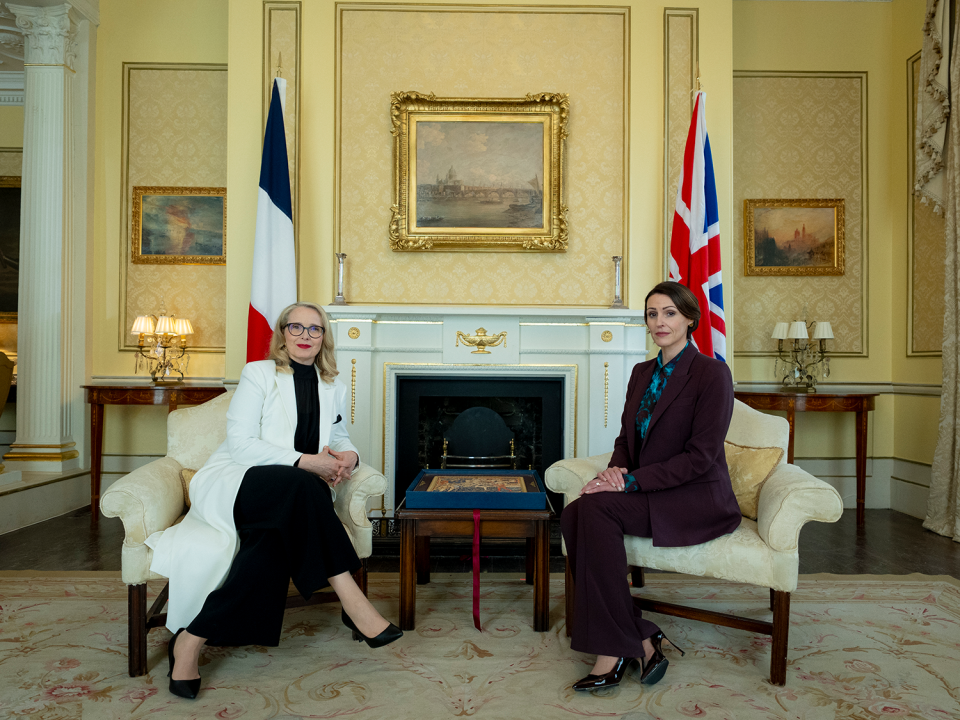
Apart from hunting, one of the very few consolations of the end of summer is that telly stops being quite so dire. But that moment hasn’t quite arrived yet – as you can tell from the fact that I’m reviewing Hostage.
There’s so much that is annoying about Hostage that I don’t know quite where to begin. But let’s start with its cloth-eared use of the word ‘abducted’. Suppose you were the prime minister (Suranne Jones) and your implausible Médicins Sans Frontières husband Alex (Ashley Thomas) had been kidnapped by a masked terror group in French Guiana and you had to brief your teenage daughter on what had happened, which verb would you use: the formal, uptight, Latinate, police-procedural one or the normal spoken-English one?
Some viewers, I know, have fallen for this rubbish in a big way. I read one newspaper critic describing it as a ‘rollicking, propulsive and compulsive yarn’, while another name columnist gushed that she was rushing off to watch the final episode. These aren’t stupid people. Both of them – I checked – were educated at Cambridge, which is a well-regarded Fenland university for people almost clever enough to get into Oxford. So what exactly are such chattering-class influencers doing endorsing this tosh?
I see it as yet another sign that we are living in End Times. Consider the very real and pressing domestic issues a thriller set in Downing Street could have used as its backdrop: the destruction of the landscape and the economy by net zero; digital ID, censorship and the inexorable march towards technocratic tyranny; mysterious groups of apparently unassimilable fighting age males lodged in seemingly every town and village. But Hostage shuns them all in favour of ‘Gawd bless the NHS’, ‘Diversity is our strength’ and ‘Human rights über alles’.
Here is the deal that fictional PM Abigail Dalton wants to negotiate with heartless, hard-right French president Vivienne Toussaint (Julie Delpy): in return for some much-needed pharmaceuticals (which nowhere but France can provide, apparently), she will treat and house some unwanted Ebola-stricken refugees from one of France’s colonies. Eh? There’s unlikely to be a single real-life viewer – not even a Guardian-reading one, I doubt, at this terminal stage of our national decline – going: ‘Yes! This is my kind of leader! A boatload of foreigners suffering with the deadliest disease known to mankind is exactly what we need to save our NHS and make Britain great again!’
There’s an argument, I suppose, that this is just harmless escapism. But I’m not buying it. I don’t care how many twists, turns, betrayals, cliffhangers, bombshells and other cheap plot devices it chucks in to distract from its calculating malignity. In the guise of mere bad art, Hostage is an act of cultural aggression, almost a humiliation ritual. What it’s telling you is: ‘Here’s an insultingly implausible drama that ducks and trivialises all the issues, utterly misrepresents the nature of politics and cheats you into endorsing ideological positions you loathe. And you’re going to suck it up and enjoy it because you’re a craven consumer and we despise you.’
Initially, I thought that Two Graves might be better. But that’s because for the first half-hour I was distracted by the pretty white houses in the picturesque Malaga hilltop setting (Frigiliana), by the delicious-looking food (rabbit with garlic) and by the fact that it had subtitles, which usually translates as ‘not quite as moronic as a British or American series’. Also, I quite liked the heroine (Kit Manver), a doting grandmother and piano teacher turned Miss Marple sleuth on the trail of her granddaughter’s murderer.
What I should have remembered is another of my usually infallible viewing rules: any drama with pianos or piano teachers will always depress the pants off you. (I’m still recovering from the S&M horrors of that bizarrely acclaimed arthouse film The Piano Teacher.) So it proves here. Our Spanish Miss Marple teams up with the local gangster (one of the dead girls’ dads) and they start brutally murdering the various suspects, even ones who are more or less innocent. None of the characters is remotely sympathetic.
Who writes this kind of relentlessly negative sicko misery porn? To whom is it addressed? What is it trying to achieve? Why do we put up with it?









Comments